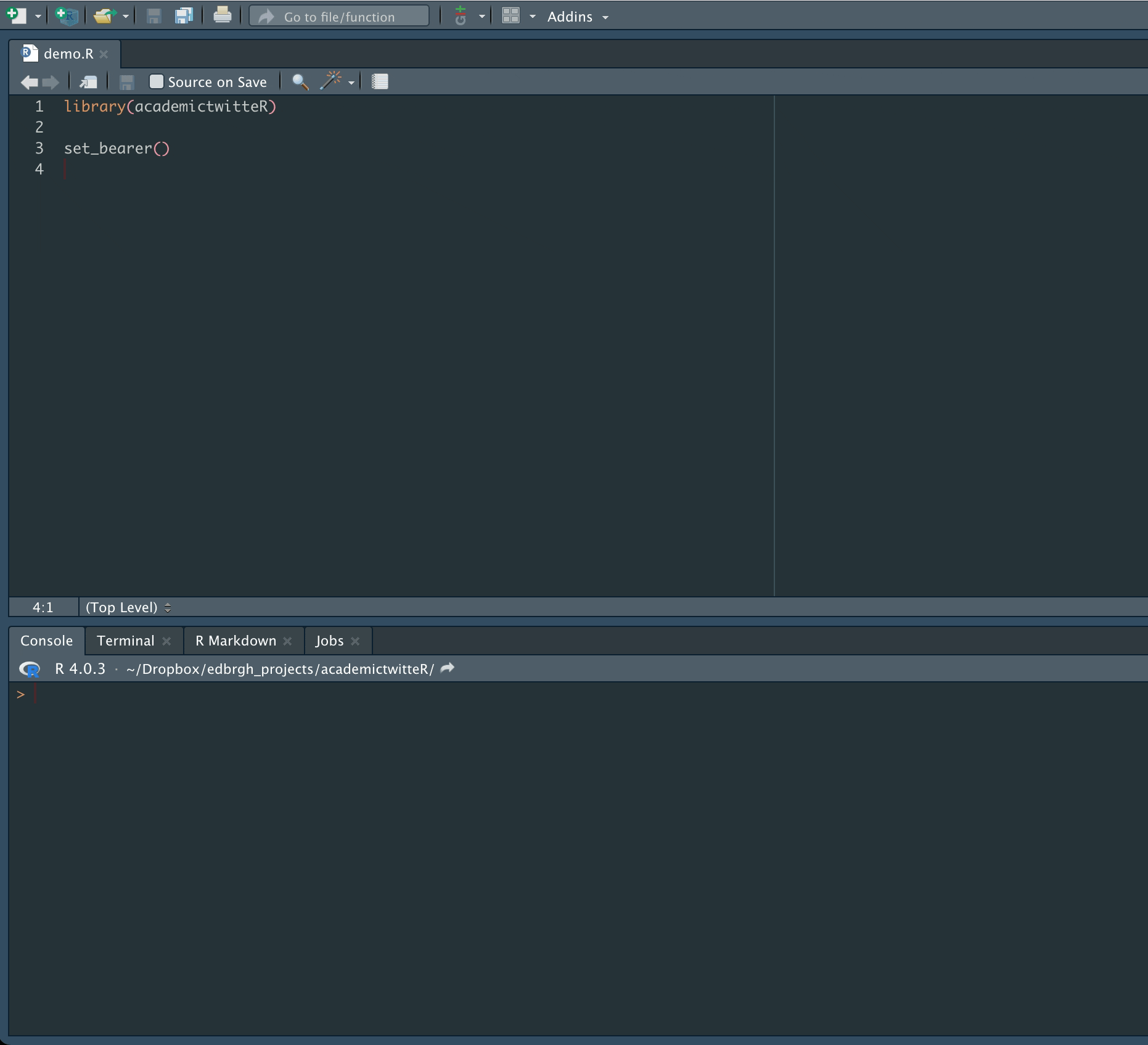

Repo containing code to for R package academictwitteR to collect tweets from v2 API endpoint for the Academic Research Product Track.
To cite package ‘academictwitteR’ in publications use:
A BibTeX entry for LaTeX users is:
@article{BarrieHo2021,
doi = {10.21105/joss.03272},
url = {https://doi.org/10.21105/joss.03272},
year = {2021},
publisher = {The Open Journal},
volume = {6},
number = {62},
pages = {3272},
author = {Christopher Barrie and Justin Chun-ting Ho},
title = {academictwitteR: an R package to access the Twitter Academic Research Product Track v2 API endpoint},
journal = {Journal of Open Source Software}
}
You can install the package with:
install.packages("academictwitteR")Alternatively, you can install the development version with:
devtools::install_github("cjbarrie/academictwitteR", build_vignettes = TRUE)Get started by reading
vignette("academictwitteR-intro").
To use the package, it first needs to be loaded with:
library(academictwitteR)The academictwitteR package has been designed with the
efficient storage of data in mind. Queries to the API include arguments
to specify whether tweets be stored as a .rds file using the
file argument or as separate JSON files for tweet- and
user-level information separately with argument
data_path.
Tweets are returned as a data.frame object and, when a
file argument has been included, will also be saved as a
.rds file.
When collecting large amounts of data, we recommend the workflow described below, which allows the user : 1) to efficiently store authorization credentials; 2) to efficiently store returned data; 3) bind the data into a data.frame object or tibble ;4) resume collection in case of interruption; and 5) update collection in case of need.
The first task is set authorization credentials with the
set_bearer() function, which allows the user to store their
bearer token in the .Renviron file.
To do so, use:
set_bearer()and enter authorization credentials as below:

This will mean that the bearer token is automatically called during API calls. It also avoids the inadvisable practice of hard-coding authorization credentials into scripts.
See the vignette documentation
vignette("academictwitteR-auth") for further information on
obtaining a bearer token.
The workhorse function is get_all_tweets(), which is
able to collect tweets matching a specific search query or all tweets by
a specific set of users.
tweets <-
get_all_tweets(
query = "#BlackLivesMatter",
start_tweets = "2020-01-01T00:00:00Z",
end_tweets = "2020-01-05T00:00:00Z",
file = "blmtweets",
data_path = "data/",
n = 1000000,
)
Here, we are collecting tweets containing a hashtag related to the Black Lives Matter movement over the period January 1, 2020 to January 5, 2020.
We have also set an upper limit of one million tweets. When
collecting large amounts of Twitter data we recommend including a
data_path and setting bind_tweets = FALSE such
that data is stored as JSON files and can be bound at a later stage upon
completion of the API query.
tweets <-
get_all_tweets(
users = c("jack", "cbarrie"),
start_tweets = "2020-01-01T00:00:00Z",
end_tweets = "2020-01-05T00:00:00Z",
file = "blmtweets",
n = 1000
)
Whereas here we are not specifying a search query and instead are requesting all tweets by users @jack and @cbarrie over the period January 1, 2020 to January 5, 2020. Here, we set an upper limit of 1000 tweets.
The search query and user query arguments can be combined in a single API call as so:
get_all_tweets(
query = "twitter",
users = c("cbarrie", "jack"),
start_tweets = "2020-01-01T00:00:00Z",
end_tweets = "2020-05-01T00:00:00Z",
n = 1000
)Where here we would be collecting tweets by users @jack and @cbarrie over the period January 1, 2020 to January 5, 2020 containing the word “twitter.”
get_all_tweets(
query = c("twitter", "social"),
users = c("cbarrie", "jack"),
start_tweets = "2020-01-01T00:00:00Z",
end_tweets = "2020-05-01T00:00:00Z",
n = 1000
)While here we are collecting tweets by users @jack and @cbarrie over the period January 1, 2020 to January 5, 2020 containing the words “twitter” or “social.”
Note that the “AND” operator is implicit when specifying more than one character string in the query. See here for information on building queries for search tweets. Thus, when searching for all elements of a character string, a call may look like:
get_all_tweets(
query = c("twitter social"),
users = c("cbarrie", "jack"),
start_tweets = "2020-01-01T00:00:00Z",
end_tweets = "2020-05-01T00:00:00Z",
n = 1000
), which will capture tweets containing both the words “twitter” and “social.” The same logics apply for hashtag queries.
Whereas if we specify our query as separate elements of a character vector like this:
get_all_tweets(
query = c("twitter", "social"),
users = c("cbarrie", "jack"),
start_tweets = "2020-01-01T00:00:00Z",
end_tweets = "2020-05-01T00:00:00Z",
n = 1000
), this will be capturing tweets by users @cbarrie or @jack containing the words “twitter” or social.
Finally, we may wish to query an exact phrase. To do so, we can
either input the phrase in escape quotes, e.g.,
query ="\"Black Lives Matter\"" or we can use the optional
parameter exact_phrase = T (in devt. version) to search for
tweets containing the exact phrase string:
tweets <-
get_all_tweets(
query = "Black Lives Matter",
exact_phrase = T,
start_tweets = "2021-01-04T00:00:00Z",
end_tweets = "2021-01-04T00:45:00Z",
n = Inf
)See the vignette documentation
vignette("academictwitteR-build") for further information
on building more complex API calls.
Files are stores as JSON files in specified directory when a
data_path is specified. Tweet-level data is stored in files
beginning “data_”; user-level data is stored in files beginning
“users_”.
If a filename is supplied, the functions will save the resulting tweet-level information as a .rds file.
Functions always return a data.frame object unless a
data_path is specified and bind_tweets is set
to FALSE. When collecting large amounts of data, we
recommend using the data_path option with
bind_tweets = FALSE. This mitigates potential data loss in
case the query is interrupted.
See the vignette documentation
vignette("academictwitteR-intro") for further information
on data storage conventions.
Users can then use the bind_tweets convenience function
to bundle the JSONs into a data.frame object for analysis in R as
such:
tweets <- bind_tweets(data_path = "data/")
users <- bind_tweets(data_path = "data/", user = TRUE)To bind JSONs into tidy format, users can also specify a tidy output format.
bind_tweets(data_path = "tweetdata", output_format = "tidy")See the vignette documentation
vignette("academictwitteR-tidy") for further information on
alternative output formats.
The package offers two functions to deal with interruption and
continue previous data collection session. If you have set a data_path
and export_query was set to “TRUE” during the original collection, you
can use resume_collection() to resume a previous
interrupted collection session. An example would be:
resume_collection(data_path = "data")If a previous data collection session is completed, you can use
update_collection() to continue data collection with a new
end date. This function is particularly useful for getting data for
ongoing events. An example would be:
update_collection(data_path = "data", end_tweets = "2020-05-10T00:00:00Z")For more information on the parameters and fields available from the v2 Twitter API endpoint see: https://developer.twitter.com/en/docs/twitter-api/tweets/search/api-reference/get-tweets-search-all.
get_all_tweets() accepts a range of arguments, which can
be combined to generate a more precise query.
| Arguments | Description |
|---|---|
| query | Search query or queries e.g. “cat” |
| exact_phrase | If TRUE, only tweets will
be returned matching the exact phrase |
| users | string or character vector, user handles to collect tweets from the specified users |
| reply_to | string or character vector, user handles to collect replies to the specified users |
| retweets_of | string or character vector, user handles to collects retweets of tweets by the specified users |
| exclude | string or character vector, tweets containing the keyword(s) will be excluded |
| is_retweet | If TRUE, only retweets will
be returned; if FALSE, retweets will not be returned, only
tweets will be returned; if NULL, both retweets and tweets
will be returned. |
| is_reply | If TRUE, only reply tweets
will be returned |
| is_quote | If TRUE, only quote tweets
will be returned |
| is_verified | If TRUE, only tweets whose
authors are verified by Twitter will be returned |
| remove_promoted | If TRUE, tweets created for
promotion only on ads.twitter.com are removed |
| has_hashtags | If TRUE, only tweets
containing hashtags will be returned |
| has_cashtags | If TRUE, only tweets
containing cashtags will be returned |
| has_links | If TRUE, only tweets
containing links and media will be returned |
| has_mentions | If TRUE, only tweets
containing mentions will be returned |
| has_media | If TRUE, only tweets
containing a recognized media object, such as a photo, GIF, or video, as
determined by Twitter will be returned |
| has_images | If TRUE, only tweets
containing a recognized URL to an image will be returned |
| has_videos | If TRUE, only tweets
containing contain native Twitter videos, uploaded directly to Twitter
will be returned |
| has_geo | If TRUE, only tweets
containing Tweet-specific geolocation data provided by the Twitter user
will be returned |
| place | Name of place e.g. “London” |
| country | Name of country as ISO alpha-2 code e.g. “GB” |
| point_radius | A vector of two point coordinates latitude, longitude, and point radius distance (in miles) |
| bbox | A vector of four bounding box coordinates from west longitude to north latitude |
| lang | A single BCP 47 language identifier e.g. “fr” |
| url | string, return tweets containing specified url |
| conversation_id | string, return tweets that share the specified conversation ID |
There are three functions to work with Twitter’s Batch Compliance
endpoints: create_compliance_job() creates a new compliance
job and upload the dataset; list_compliance_jobs lists all
created jobs and their job status; get_compliance_result()
downloads the result.
Function originally inspired by Gist from https://github.com/schochastics.
Please note that the academictwitteR project is released with a Contributor Code of Conduct. By contributing to this project, you agree to abide by its terms.